Helpful advice on Care
How To Comfortably Transistion From Home Care to Live-in Care
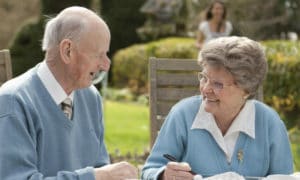
Creating a Low-Maintenance Garden For the Elderly
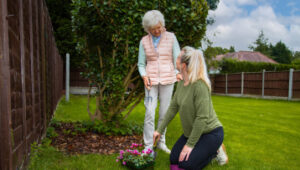 Gardening is a healthy skill which requires practice and patience and may not turn out perfectly the first time around. Gardening can be especially beneficial to elderly people for its many physical and mental health benefits. The challenge of gardening is a relaxing and positive one; getting back to nature and transforming your garden from a barren wilderness into a garden of Eden.
Gardening is a healthy skill which requires practice and patience and may not turn out perfectly the first time around. Gardening can be especially beneficial to elderly people for its many physical and mental health benefits. The challenge of gardening is a relaxing and positive one; getting back to nature and transforming your garden from a barren wilderness into a garden of Eden.
Essential Homecare Supplies and Where You Can Get Them
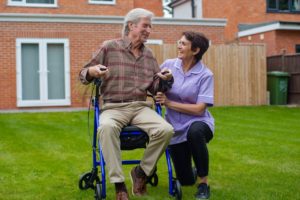
A Complete Guide To Care Plans

The Best Transport Options for The Elderly
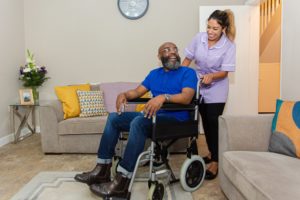
How you can make your home safer for those receiving care

The Causes of Swollen Legs in The Elderly
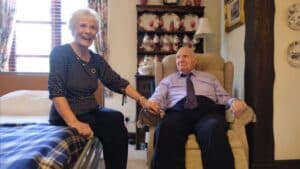
Easter Activities for the Elderly
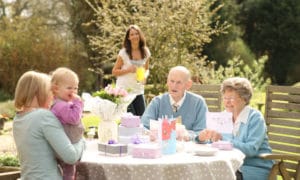
The Difference Between Care Home and Home Care
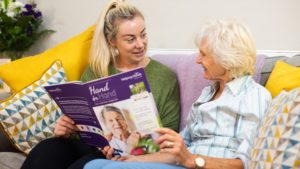
Activities to do on Father’s Day for the Elderly
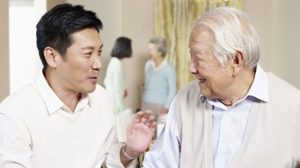
The Importance of Reading for the Elderly
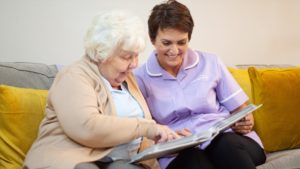
What to Know About Dementia and Confabulation

Living with dementia can be confusing and disorienting at times, and if someone is struggling to recall a particular memory they may fill the gap with a false or distorted memory, otherwise known as a confabulation. This isn’t a deliberate deception, their brain is creating or distorting their memory as a result of the dementia.
Mother’s Day Activities for the Elderly

Mother’s day does not have to be all about gift giving, it is a great opportunity to spend valuable quality time with your loved ones. It is beneficial as it can strengthen your bond with your mother and allow you to grow closer. Activities can range from afternoon tea to booking a weekend away with your mother.
What are some dementia friendly colours?
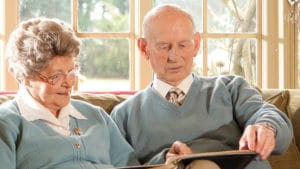
Colours are often overlooked in the bigger picture of living well with dementia, but it turns out colours can affect a person with dementia a great deal.

What is Show Timing in Dementia Patients?
Show timing is where people with dementia will act coherently around medical professionals but exhibit confused and lost emotions around carers and loved ones. This may prove difficult for the person to get correctly diagnosed and cause carers to get frustrated as they are unable to get the help they need due to their concerns being taken seriously.
How Does Shingles Affect the Elderly?

Shingles occurs due to a weakened immune system which is unable to fight off the infection. The symptoms can range from itchiness to headaches which can cause discomfort for the individual with shingles. It is best to seek your GP’s or a pharmacist’s advice in the how to treat your case of shingles.
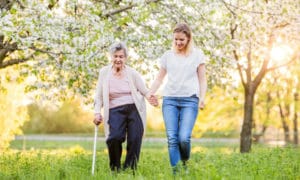
Oedema is the swelling of the legs, ankles and feet by a build up of fluid in these areas. This can make day to day tasks difficult to complete and causes the person with oedema a large amount of the pain. It is advised that you seek help from a medical professional if you show symptoms to get checked and can then be effectively treated.
Valentine’s Day activities for the Elderly
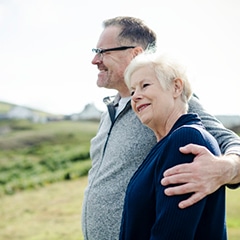
Valentine’s Day is usually a day for love but for the elderly it can often be a lonely time due to the loss of a loved one. With the reminders leading up to the day making the loss even harder for the person. These activities will be sure to put you in a positive mood and allow you to make new memories with your family.
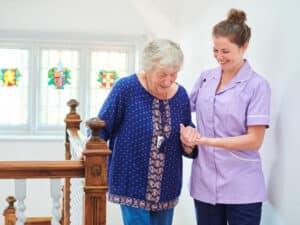
There are different types of anaemia which can be treated differently. Anaemia is more common in older persons and those over 65 can be at high risk. The causes can vary as they can range from an iron deficiency to chronic conditions. With symptoms varying from tiredness to mouth ulcers, it is best to get advice from your doctor to better understand how to treat your anaemia.
How to keep the Elderly warm during Cold Weather

As we age we can be more susceptible to illness which is brought on by cold weather due to a weakened immune system. There might also be the fear of switching on the heating due to the rising living costs. There are a variety of ways in which you can stay warm during cold weather from having extra layers on to movement and exercises.
Pneumonia is an infection which causes inflammation within the lungs and its severity varies from person to person. As we age we become more susceptible to viral and bacterial infections which may bring on pneumonia. But it can also be down to underlying health issues. It is best to get checked as soon as symptoms become noticeable to increase recovery time from the illness.
What to know about Dementia Memory Boxes
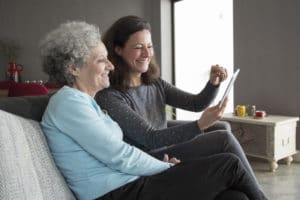
Dementia Memory Boxes can help stimulate the memory of those with dementia allowing them to be more comfortable in their surroundings. These items can be especially valuable if someone has had to leave familiar surroundings and move somewhere less familiar, such as moving out of their home and into residential accommodation.
Sciatica symptoms range from shooting to burning pain down the legs causing great discomfort. It usually goes away on its own and in most cases, you won’t need any extensive treatment. The usual ways of treating sciatica is in the form of regular exercise and staying active but your GP should be consulted before starting any treatment.


What are some Elderly Bedwetting Solutions
Bedwetting or nocturnal enuresis, is a condition where the bladder empties during sleep and is common among children as well as older adults. This can stem from neurological conditions to high fluid intake. It is no fault of your own and can be treated through a range of different methods.
Why do the Elderly Experience Increased Flatulence?
Flatulence may increase as you age and can be caused by a variety of different factors such as diet as well as smoking. By having a greater understanding of the cause will enable you to have better hold of your flatulence.

Dancing is a fantastic hobby to get into at any age, whether it’s for exercise, lifting our moods, or socialisation. Dancing helps to improve your physical and mental well-being proving to be a beneficial activity to do.
A Guide to Diabetes in the Elderly

While most of the care and advice for diabetes is relevant to all age groups, there are some things that are specific to older people living with the condition. Diabetes is a serious condition that can affect people at any age.
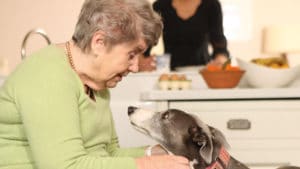
Dementia can be a frustrating and anxious time for people with the condition as they can get confused about their surroundings. Animal therapy has long been recognised as a beneficial way for people living with various conditions as it encourages increased movement and social interaction.
Healthy Snacks for the Elderly

Although we all love snacking, having healthy snacks is important, as it provides us with the essential nutrients needed to stay healthy. Ensuring you have the right snacks each day can help improve your wellbeing. They can also help lower the risk of complex conditions, including heart disease, stroke and diabetes.
How to Assist the Elderly with Dysphagia
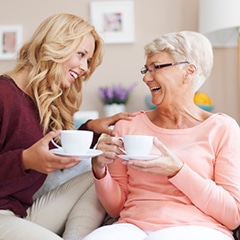
How to Help Someone with Aphasia and Dementia

Why do the Elderly Lose Weight?

With age, it is normal to see a slight decrease in body weight, although unintentional weight loss can be dangerous. It can be a concern and a symptom of an underlying health issue, such as malnutrition. This is when your body isn’t getting the right amount of nutrients. So, it is essential to monitor your weight on a regular basis.
What to do when elderly people stop taking medication
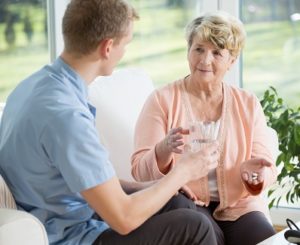
There are many reasons why older people may stop taking their medication, such as confusion about when and how it should be taken, feeling better and thinking they no longer need it, or concerns about becoming dependent.
What Causes Elderly Skin Bruising?
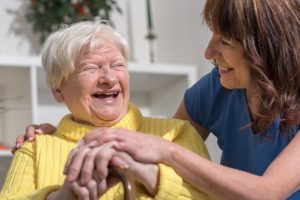
As we age, our skin becomes thinner, which means it loses its elasticity and the protective fatty layer that helps protect blood vessels. Hence, the reason why bruising is common in older adults. If you experience a bump or rub your skin, older individuals are more susceptible to getting a bruise and will most likely take longer to heal.
The Benefits of Music Therapy for Elderly People
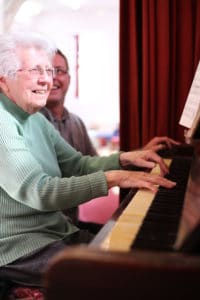
The health benefits of music therapy are both physical and mental. Not only can music make a difference to every aspect of a person’s wellbeing but could especially benefit people who are living with dementia. Some of the abilities that are affected by dementia include concentration, attention span, memory, and communication skills, but there is evidence that music can have a positive impact on all of these.
Benefits of Movies for Someone Living with Dementia
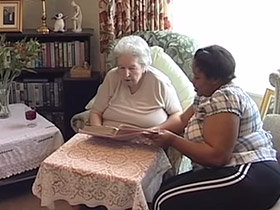
Movies can help stimulate memories which may lead to conversation, consequently helping to reduce feelings of isolation. Regardless of the type of film preferred, watching movies together with loved ones can help generate a feeling of closeness with them that family may be struggling to experience as the person’s dementia progresses.
Why do Elderly People Get Cold?
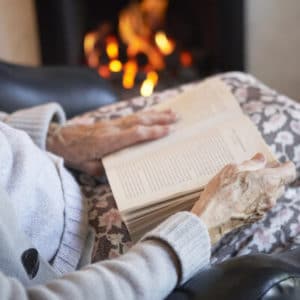
There are various reasons why we feel the cold more as we age, some of these are health-related while others are economic. It is crucial to tackle feeling cold as we age though, as the statistics on the risks of not doing so make stark reading.
How to Utilise Art Therapy for Dementia
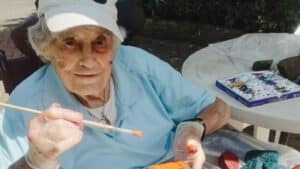
Art therapy is a technique for people living with dementia to express themselves in a meaningful way, especially if their communication skills are affected. Caregivers can utilise art therapy to help someone express their creativity, which can in some cases lead to reduced anxiety and frustration for people living with dementia.
Reminiscence Therapy for Dementia
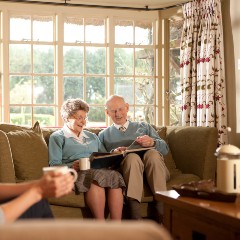
Reminiscence therapy works on drawing out the comforting memories that the person can access and encouraging interaction – for instance looking through a photo album of the person’s wedding day together and talking about how the day made them feel.
How to Support Someone with Anxiety and Dementia
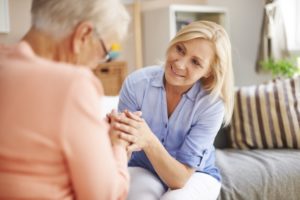
For some people, anxiety is triggered by a specific event, such as a diagnosis of a life-limiting condition, and for people diagnosed with dementia, it’s natural that anxiety could develop. This could be down to the stress of receiving a diagnosis and worrying about what the future may hold, concerns about the impact that dementia may have on family life, or social isolation.
The Benefits of Baking for People Living with Dementia

Whether it’s a fluffy Victoria sponge, a moist red velvet or something rich and chocolatey, we Brits definitely love a good cake. It’s no secret that participating in a creative, hands-on activity such as baking can help someone living with dementia to manage the symptoms of their condition.
Can Someone Living With Dementia Benefit from a Pet?
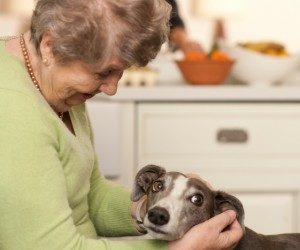
We understand the difference a furry friend can make to the well-being and quality of life of someone living with dementia. Your pet’s needs come hand in hand with your own, so we will incorporate these into your support plan. Your carer will be there to fit in with your life and your schedule, and isn’t restricted to office hours.
How the elderly can stay involved in sports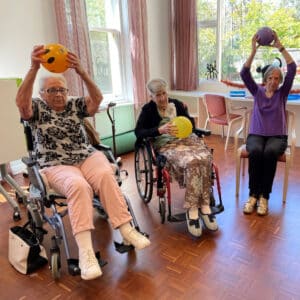
We are also big supporters of staying active and ensuring you live life to the fullest. This is why our carers will encourage you to go for walks, swim and join exercise classes, as it will benefit you or your loved one in more ways than one. You’ll socialise with various people, stay healthy and boost your confidence. If you like, our carers will join in, too.
What to look for in a computer for the elderly?

Computers and tablets are everyday devices that many rely on, but deciding what works for you is essential. Whether you are looking for a computer or prefer having something a little more lightweight, like a laptop or tablet, you have come to the right place.
The Link Between High Blood Pressure and Dementia

High blood pressure affects brain function in several ways. Having high blood pressure puts a lot of strain on the arteries, and this thickens, narrows, and stiffens their walls over time. If this process happens in the brain, then this will prevent oxygen and essential nutrients reaching brain cells and lead to them becoming damaged.
What are the Different Types of Strokes?

It is essential to be aware of the symptoms of an ischaemic stroke, including numbness or weakness on one side of the body, confusion, difficulty walking, severe headache, nausea, dizziness, blurred or double vision and slurred speech. If you experience any of these symptoms, dial 999 immediately.
Caring for a patient with dementia anger issues

Everyone gets angry from time to time, but for people who are living with dementia this can be labelled as challenging, without the people around them understanding why they’re acting in that way.
The Pros and Cons of Doll Therapy in Dementia Care
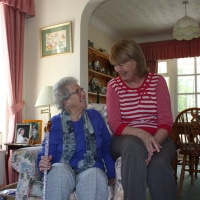
Doll therapy is found to work because it can give people living with dementia a renewed purpose and opportunity to connect with the world around them. This can increase their energy levels and mood and support them to live well.
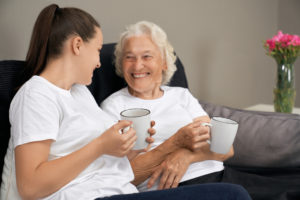
You may require additional care and support even before dementia has been definitively diagnosed, perhaps because you are struggling with your memory, confusion, or orientating your movements. The most important thing to remember is that you can have additional support at home whenever you want it – it’s not just for after a serious diagnosis.
Respite Care for Dementia Patients
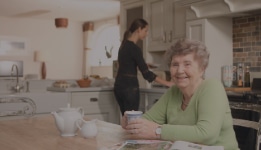
When you are looking after a loved one with dementia, it can be challenging. Having respite care allows you to take time out for yourself and enables you to recharge your batteries. We understand you may feel guilty, but caring for yourself is essential.

If you are living with the symptoms of cognitive decline and are yet to have a dementia assessment, you may feel that you’d benefit from some additional support around your home until you know the outcome. If however you have had your assessment and you have been formally diagnosed, you may want to consider your future care requirements and get them in place in good time.
Benefits of Dementia Care at Home
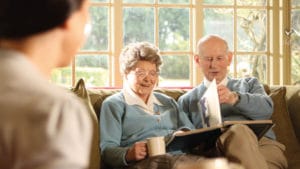
We all want the best for our loved ones, especially if they are living with a complex condition like dementia. It can be challenging, but different types of dementia care are available, enabling individuals to live an independent and active lifestyle.
Getting Support and Help for Dementia Patients
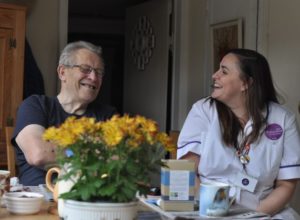
While it can be difficult to know where to turn once you have a formal diagnosis of dementia, there are charities and organisations who will be able to advise you on how to live well, moving forward.
The Use of Montessori in Dementia Care

The Montessori method allows the individual to develop at their own pace and in their preferred direction, rather than the ‘one size fits all’ approach that traditional education often dictates.

An ischaemic stroke is when a blood clot blocks blood flow to the brain, damaging brain cells, which ultimately affects your body. It is essential to note that any type of stroke must be treated effectively and quickly to prevent long-term disability and save lives.
Caring for Someone with Dementia
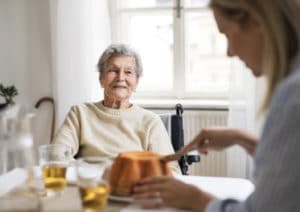
Caring for a parent with dementia at home can be the very best thing for their wellbeing, however it can create additional challenges. Post-diagnosis it can be difficult for loved ones to reconcile how their parent’s needs will change, and even the most informed can find the new situation overwhelming.

Being diagnosed with Parkinson’s disease can initially cause problems with movement, such as balance, coordination, and muscle stiffness, although as time progresses people can also start to have problems with memory. Around a third of people living with Parkinson’s disease will go on to develop dementia.
Adaptive Equipment for Parkinson’s Patients

As we age, certain conditions can limit our independence. However, support and products are available to help make life a little easier, especially for individuals living with Parkinson’s.
How to Help Increase Mobility in Elderly People
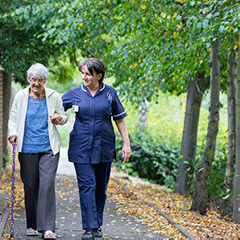
Reduced mobility is something that can occur to everyone as they age; after all, in their younger years a person is often juggling many time-intensive tasks, such as working, bringing up a family, caring for parents, etc. As children grow up and retirement beckons, a slower pace of life is often the result, with hours to fill and the looming risk of sitting in the same place for too long.
How to Promote Independence in Elderly People

Losing our independence is something that many people worry will happen as they age, especially if they feel they need some additional support with everyday tasks. The thought of having someone you don’t know in your home, or worse, having to leave your beloved home altogether means that becoming older can be something that many people fear.
Understanding the Reasons Behind Fatigue in the Elderly
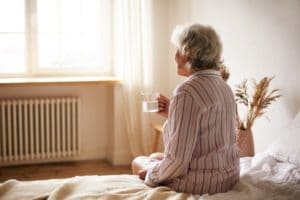
Fatigue can affect individuals in different ways, especially older adults. Although it may be normal, if you always feel tired, you should contact your GP, as this could be a sign of an underlying health condition.
How to Encourage Hobbies for the Elderly

Whether we’re experiencing scorching summer temperatures, or the thermometer is below freezing it’s important to fill our days with worthwhile activities so that we don’t become isolated. This is especially true in older life, when mobility difficulties may prevent people from leaving home as much as they used to, and loneliness and social isolation can be even more of a risk.
Gardening for Dementia Patients
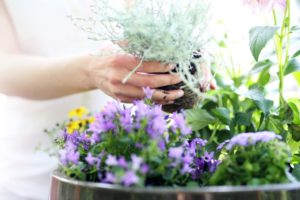
There’s little doubt that spending time outdoors when the weather is good can benefit any one of us, however when you’re living with the cognitive decline that can happen with types of dementia, being in calming, familiar surroundings can make all the difference to your wellbeing.
Planning Holidays for People with Dementia
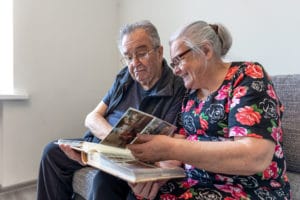
We all love a holiday. It allows us to wind down, explore different cultures and recharge our batteries. However, holidays are highly beneficial for individuals living with dementia as it positively impacts their well-being, giving them confidence and uplifting their mood.
What to do When a Dementia Patient Stops Eating
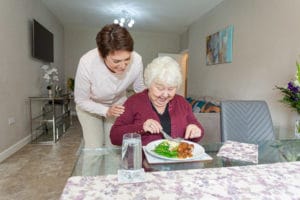
If a person living with dementia stops eating there can be various reasons for this, some more obvious than others. For instance, loved ones may presume that the person is simply forgetting to eat and that by reminding them the problem will be solved, but it may not be that simple.
What is Person Centred Dementia Care?

Person-centred care is putting you first. It’s when the care is focused on the individual’s needs, ensuring that their preferences, values, and requirements are provided for and fulfilled.
10 Assistive Devices for the Elderly

As we age, we can all benefit from some additional support inside and outside of our home. One of the ways we can find tasks easier is if we have additional equipment or devices that can assist with our daily life.
Memory Games for Dementia Patients

As part of living with dementia, a medical professional may have advised you to spend time on activities that can aide your memory for as long as possible, such as word and number games, or trivia puzzles.
How Important is Social Interaction in Elderly Care?

No matter how old you are, we can all benefit from a bit of social interaction. Whether it’s a lunch date with friends, attending a community class or simply having a good catch-up over a cuppa, social interaction is beneficial for mental upkeep. However, it is essential for older individuals, as loneliness is a growing concern amongst individuals over 75.

Palliative care is the journey of care and support that you embark upon when diagnosed with a terminal illness. The palliative care journey can encompass treatments, therapies, and activities that, while not able to cure your illness, will aim to keep you as comfortable, pain-free, and active for as long as possible.
Why is Respite Care Important for Carers?
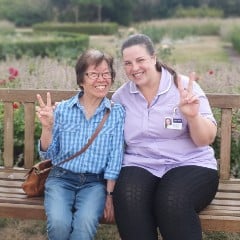
Carers work incredibly hard to make sure that the person they’re supporting is well looked-after, however that can also then leave them at risk of carer burnout. Caring for others is very rewarding and one that brings many positives to the lives of both the carer and the person being supported, however it can also be very tiring at times as the carer is giving of themselves, both emotionally and physically.
Spotting the First Signs of Cancer in the Elderly

Spotting signs of cancer early on can make a huge impact and treatment is more likely to be more successful. So, it is essential to look out for anything unusual and contact your GP if you have any concerns.
How to Make Life Easier for Elderly People with Arthritis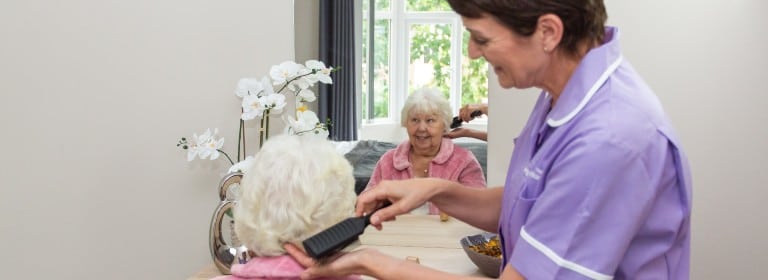
Caring for someone who’s living with arthritis can present its own challenges to completing everyday tasks, however by working together and making sure that suitable support is in place there’s no reason why you can’t enjoy living independently.

According to the NHS, osteoporosis is a progressive condition “that weakens the bones, making them fragile and more likely to break.” It’s a health condition that develops slowly over many years and can cause severe fractures. It tends to be diagnosed when an individual has had an injury which could occur in the wrist, hip or spine.
Leflunomide Treatment in Elderly Patients

Leflunomide is a ‘disease-modifying’ drug and is one of a number of different treatments that may be used to relieve the symptoms of rheumatoid arthritis. Others includes methotrexate, hydroxychloroquine, and sulfasalazine. Every person being treated for rheumatoid arthritis is an individual and their immune system may respond differently to different medications, so your healthcare professional will need to prescribe different medications until the one that suits you best is found.
How Effective is Invasive Testing for Elderly Heart Patients

Invasive testing is a procedure that provides information about the function and structure of an organ, in this case, the heart. Invasive testing can consist of inserting a tube, device or scope. Heart conditions can be diagnosed by blood tests, implantable loop recorders and coronary angiography, which consists of an x-ray of the heart arteries.
Parkinson’s recent research advancements to help the elderly

In January 2023, the Phase 3 Parkinson’s disease clinical trials were approved. Parkinson’s Virtual Biotech, founded by Parkinson’s UK, is a movement researching different treatment types to help individuals with the condition.
The importance of emotional support in palliative care

Being diagnosed with a life-limiting condition will understandably cause you and people close to you anxiety about the future; questions will arise around eventual physical support needs and how you will all cope emotionally.
The role of palliative care in cancer treatment
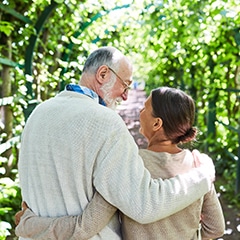
A large aspect of palliative care in cancer patients is to keep any symptoms you are having as controlled as possible, especially any pain. Managing pain is essential for maintaining quality of life for as long as possible, and this is why a whole-person, holistic approach should be made when devising an individual’s palliative support.
Cerebral Palsy: Causes, Symptoms & Treatments
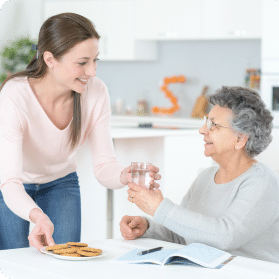
Cerebral Palsy can become more pronounced in later life because of the other naturally occurring changes that the body and brain go through as we age. If a person’s brain does not develop properly in the womb or they have a traumatic brain injury during or soon after birth, Cerebral Palsy can also be the result. Other causes can include meningitis in the young, reduced blood and oxygen supply to the brain, asphyxiation during birth, or an infection caught during pregnancy.
Tuberculosis in the Elderly: Everything You Need to Know

Tuberculosis (TB) is a bacterial infection that can severely affect individuals, especially older people. According to the NHS, it “mainly affects the lungs, but it can affect any part of the body, including the tummy (abdomen), glands, bones and nervous system.” However, it can be treated with the right medication.
10 signs of loneliness in elderly parents
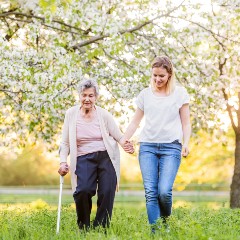
Loneliness can affect any of us at any point in our lives, however if it’s caused by the loss of a long-term partner there is also the pain of grief to deal with. Shared pain or uncertainty about how best to approach someone who’s grieving can compound loneliness even further. Loss of a partner is only one reason why loneliness can be worse as we age though.
Main types of elderly stroke types and treatments
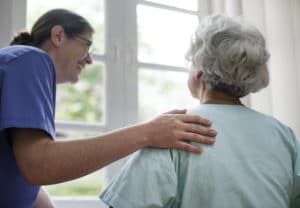
With the right stroke care and treatment, it is still possible to live an independent life at home. It is essential to be aware that prompt treatment is required for any stroke to decrease the risk of brain damage and other health complications. Also, the therapies available for older patients may differ from the medical treatment given to others. Let us explain…
What to do when an elderly parent refuses help
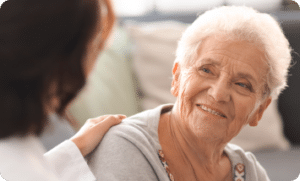
While none of us have the right to tell someone else how to live their life, when we feel that a loved one could benefit from additional help but is resisting that help, it can be difficult.
10 steps to take when ageing parents need help

It’s not easy seeing your parents growing older. Many see their parents as their strength and people they admire. Your mum or dad may have always lived independently, spent their time looking after you, and taken on the house responsibilities.
Best Christmas gifts for the elderly

Once again, it’s that time of year when we all struggle to select a special present for our loved ones. Whether you’re looking for a present for a grandparent, something to relieve arthritis pain, or anything to help manage dementia-related symptoms, we’ve got you covered.
Here’s a list of thoughtful gifts for the elderly that will brighten their day. From practical and reusable gifts to keepsakes and personalised mementos, you’ll find something to tuck underneath the Christmas tree.
Tips to help the elderly this Christmas
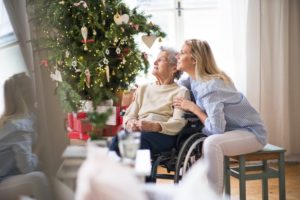
Christmas can be a wonderful time of year for some – seeing loved ones, buying presents, and overindulging in mince pies – but for many older people it can also be an unwelcome reminder of loneliness.
Being bombarded with images of family reunions and joyful occasions can be hard for people who may not have family living nearby or don’t have a wide social circle, so everyone should pause during the festivities and consider the wellbeing of older people who live nearby.
10 benefits of lifestyle support for the elderly
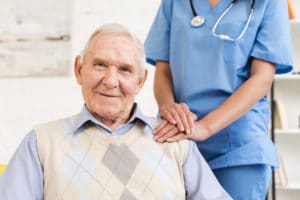
You may feel indignant if a loved one suggests you need extra help at home – after all, you’ve lived independently for decades and never needed support with your daily tasks; however, accepting help is not failing.
Ageing has a different effect on every one of us, but something most of us have in common is that we find physical tasks more taxing than they used to be, whether that’s because of a diagnosed condition or general age-related frailties.
Ways to support a loved one with Parkinson’s

If a loved one is living with Parkinson’s or an associated condition, it can be difficult to know how best to support them to live their most comfortable and independent life. There are various ways to learn more about their condition, and accepting support from people outside of the family, such as professional carers, can also help you become more knowledgeable.
Tips on caring for a stroke patient at home
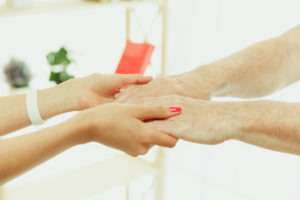
Stroke aftercare can have a huge impact on your loved one’s recovery. According to the NHS, “the injury to the brain caused by a stroke can lead to widespread and long-lasting problems.” However, the right care at home can allow your loved one to regain as much of their independence as possible.
Clever ways to make your home elderly-friendly
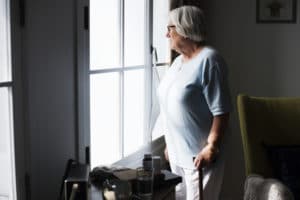
If you are looking for care for your loved one who is elderly and do not wish to relocate them to a residential care home, they can receive support on a visiting or live-in basis in the comfort of their own home. Or you may live with elderly parents or grandparents and want to ensure that there are no obstacles that can increase the risk of injury.
How to adapt your home if you have Parkinson’s
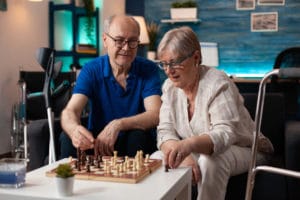
If you’re living with Parkinson’s, your home may need adaptations to ensure that you are kept as safe as possible. There are safety features that should be installed in every home, such as smoke detectors and carbon monoxide alarms, but these are even more important when you have restricted mobility as they should give you a crucial, timely warning that something isn’t right.
Breathing exercises for older adults to cope with stress

If you wake up in the morning and feel as if you need to stretch and take a deep breath then you’re not alone. Most of us wake up and feel that we need to elongate ourselves after being in bed, and our body usually tells us what it requires to start the day effectively.
Even if you’re not able to exercise you may still be able to do breathing exercises that can help you to feel better and more relaxed, and it may also relieve muscle stiffness or cramping.
How to support family and friends in palliative care
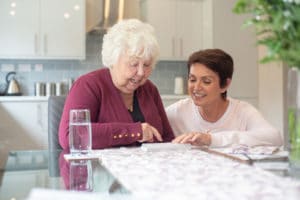
When someone is entering palliative care, you may find conversations difficult, as you may be conscious of saying something that will upset them or make the situation worse.
However, they may appreciate you talking to them about what they’re going through, and you should approach the situation sensitively to see what they’d prefer.
Exercises to reduce swollen ankles in the elderly
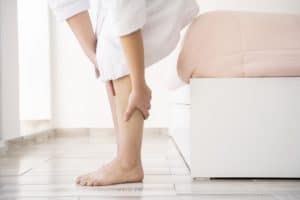
Swollen ankles also referred to as oedema, is a condition that affects people of all ages, especially the elderly. This can cause a lot of discomfort, stiffness and affect the way you walk and move around.
Exercises can aid in reducing swollen feet. However, it is best to seek advice from your GP or pharmacist before starting any type of exercise. They will be able to advise you, so you don’t cause any further damage.
The risks of high blood pressure and how to prevent it

High blood pressure, also called hypertension, is a condition where the systolic and diastolic numbers are raised above recommended parameters. When the results are received they should be looked at by a medical professional, because what is considered high for one person may be normal for another.
Why do the elderly have trouble swallowing?
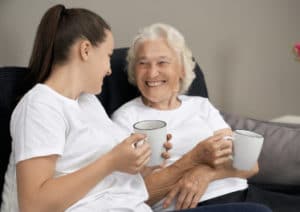
As we age our bodies start to slow down and become weaker, including our mouth muscles. According to the NHS, “the muscles used for swallowing can become weaker with age,” which is one of the reasons why swallowing issues are more common amongst the elderly. Overall, it naturally comes down to how our bodies age, as bones and muscles tend to shrink and lose mass.
Where can I get help for my elderly parents?

As we get older, it’s only natural that many of us will find ourselves requiring additional help to manage from day to day. When an elderly parent reaches a point where they can no longer look after themselves properly, you need to know there’s a support system in place to ensure they keep receiving the physical and emotional support they require to continue living independently, securely and comfortably at home.
Should your elderly parent live alone?

When an elderly parent needs care, the decision should be taken together as to whether they remain in their own home or not, but if that isn’t possible, perhaps due to a debilitating illness or loss of mental capacity, it can be hard to face such a decision alone. Find out possible options, and how to make the decision here.
The best mobile phones for the elderly

Before choosing a mobile phone you need to decide what you want it to do for you. For instance, are you only interested in making calls and sending texts, or would you need a fast internet connection that will enable you to use video calling options, or watch streaming services on the move?
Specialist shoes for the elderly

As we get older, it’s only natural that we’ll start to lose a bit of mobility and stability. This can often mean we end up being a bit less steady on our feet, which can lead to a lack of self-confidence and be detrimental to our independence. For the elderly, the risks associated with a fall become much greater – health risks include head injuries, muscle damage, bone fractures and more.
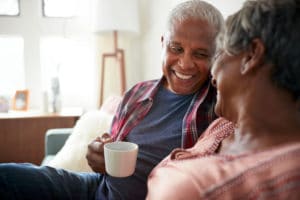
As healthcare, medicine and quality of life improve around the world, human life expectancy is experiencing an overall increase. Naturally, this is resulting in a rise in the number of elderly people to an all-time high, and that trend isn’t about to change any time soon.
With the number of retirement-age adults expected to keep growing in all regions of the world, there’s a continual need for more dedicated elderly care services to help support our aging populations and ensure they remain physically and mentally healthy.
How to care for elderly parents
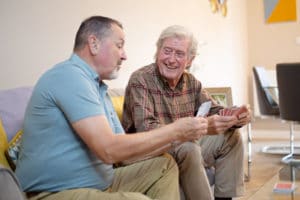
Caring for anyone is a big responsibility that can be very rewarding but comes with certain challenges, so it’s important that you understand exactly what home care is likely to entail. There are numerous elderly care websites that contain great information about caring for elderly people, people with dementia, and people living with disabilities and other medical conditions.
Fall prevention for the elderly

As time goes by, you may find yourself becoming a little unsteady on your feet, which can lead to falls. It is important to make sure that this is prevented as it can lead to serious injuries, especially if you are an older person. There are many ways to prevent falls and avoid a trip to the hospital. These include looking after your overall health and getting enough sleep. Naturally, with time, our health will change, but here are some of the ways you can lower the risk of accidents.

The most crucial thing to remember if you’re going to be involved with hoisting someone using equipment is to not attempt it at all unless you’ve been fully trained in how to use that specific equipment. Injuries can be inflicted on both the person hoisting and the person in the hoist if someone attempts to do so without being instructed on how to do so.
How often should the elderly bathe/shower?

When it comes to personal care, we all naturally want to maintain our hygiene. Many people tend to have a bath or shower at the start of the day or just before settling down to sleep. However, with age, it can become a struggle to bathe or shower daily. This may be due to mobility or simply not having enough energy. But for the elderly, having a shower once or twice a week is sufficient to keep skin conditions and infections at bay.
Meal delivery services for the elderly

Receiving meals direct to your door, as opposed to having to prepare them yourself, can be beneficial in many ways.
They can often work out cheaper than if you were to purchase all of the raw ingredients yourself, and you don’t have to cook them from scratch either!
Tackling loneliness in care homes

Only recently has loneliness become a major issue that is widely recognised in society, and as something that can have a genuine impact on someone’s physical and mental well-being.
Loneliness is particularly prevalent in care homes, where residents are more than twice as likely to report feeling lonely.
Fun festive activities for the elderly with dementia

When someone is living with dementia it doesn’t mean that they won’t enjoy the things they always used to, such as celebrating Christmas with the family and honouring long-held traditions.
However, there will be some measures that the family or carers can put in place to ensure that the person’s particular needs are respected, while still celebrating a joyful holiday season.
Brain games to improve your memory & mental health

Your mental wellbeing is important for maintaining your independence, mental health and relationships. We understand it can be a little distressing when you become forgetful or seem to be struggling with making decisions. However, there are plenty of ways to help yourself with this.
According to the Alzheimer’s Society, keeping your mind active is likely to reduce your risk of dementia.
How to reduce sleep problems in older people
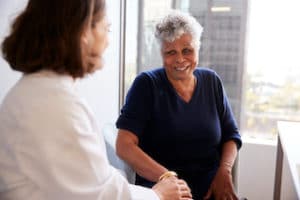
Poor sleep is more common in older people for a variety of reasons, such as pain from existing conditions, the need for more frequent urination, and the result of a slower pace of life and more frequent naps during the day.
Age UK tells us that we shouldn’t “expect to sleep as well” as we did when we were younger, and both the quality and quantity of sleep can change as we age.
The importance of sleep for older people
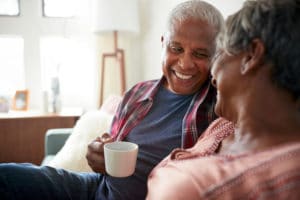
Getting a good night’s sleep has many obvious health benefits such as feeling less tired throughout the day and being refreshed when we wake up in the morning.
However, there are other benefits that may not immediately come to mind, such as improving attention span, concentration and supporting mental wellbeing.
Rapidly progressive dementia: Things to know

The presentation and progress of RPD will vary between individuals. People affected will usually develop problems with their memory, thought processes and communication.
Many people also have personality or behavioural changes and mood disturbance, as well as movement changes that can occur as a result of brain damage. These cognitive and behavioural changes can make it difficult to complete everyday tasks such as managing medications, dressing and bathing independently.
Does palliative mean end of life?
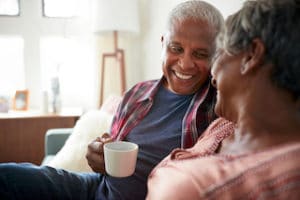
When someone begins their Palliative care journey, they are embarking on a plan of treatment, care and support for a life-limiting condition.
Palliative care isn’t just for the person themselves though, it will also include emotional support for their loved ones, to ensure that the person lives as good a quality of life as possible in their last years or months.
What is the CHC decision support tool?

NHS Continuing Healthcare (CHC) is when someone with complex long-term health needs qualifies for social care arranged and funded solely by the NHS.
Continuing healthcare can be provided in a variety of settings, but with Helping Hands you have the advantage of your continuing healthcare being provided in your own home, rather than having to move into a care home to receive it.
The best phones for people with dementia

When you’re living with dementia it’s important that you have access to technology that is going to enhance your life, not make the world around you even more confusing, and this is where telephones with simplified features can be helpful.
For instance, the phone may have larger buttons than usual, ‘one-touch’ buttons with space for photos, a loud volume setting, larger displays or a combination of several features.
How to help someone with dementia tell the time
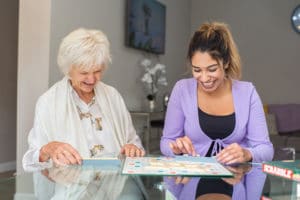
Being unable to make sense of time is something that can happen quite early in a person’s dementia journey, which is why the tests that a GP uses for memory assessment usually include drawing a clock face, with hands set at a specific time.
Being unable to make sense of time is something that can happen quite early in a person’s dementia journey, which is why the tests that a GP uses for memory assessment usually include drawing a clock face, with hands set at a specific time.
Why does dementia care cause hallucinations?

A hallucination is a sensory experience of something that appears real but is simply created in our mind. Hallucinations are commonly experienced by persons living with dementia although exact estimates of their frequency differ. The frequency of hallucinations may also depend on the type of dementia. For example, as many as three quarters of persons diagnosed with dementia with Lewy bodies, and up to two-thirds of those with Parkinson’s Disease dementia, may at some point experience hallucinations.
Ensuring brain health: the importance of mental stimulation

Mental stimulation can be classed as anything that exercises the brain. As Age UK explains, “if we want our brain to stay in peak condition, we should use it.” If we don’t, we risk cognitive decline in the form of reduced thinking skills, memory problems and creativity, amongst others.
They go on to say that “people who do more mentally stimulating activities have better thinking skills in older age.”
Improving your quality of life when living with dementia

Receiving a diagnosis of dementia can make you feel that life will never be the same again and while that’s true in some ways, living well with dementia is a very achievable situation for many people post-diagnosis. If you’ve got as far as seeking medical advice and a diagnosis, you and your loved ones will already have gone through some difficult times, involving worry, frustration and concern about the future.
How to prevent loneliness in older age
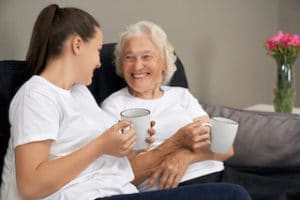
Loneliness is recognised as a condition that can significantly impact on a person’s physical and emotional wellbeing, in fact according to the Campaign to End Loneliness, it “increases the likelihood of mortality by 26%.” This is comparable to risk factors such as obesity and cigarette smoking and can also have a recognised effect on mental health.
What is a memory assessment service?

Whether it is you or a loved one who is finding that they’re persistently forgetting things, struggling with words, losing their bearings regularly or other similar symptoms, you may be concerned about the onset of dementia. Find out more about the memory assessment service here.
How to use public transport with a disability
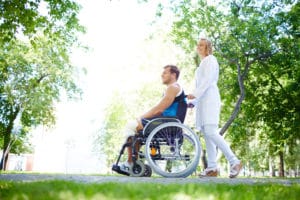
If you’re planning to use public transport, it’s worth getting in touch with the transport provider before travelling to ensure they can prepare to help you in whatever way you need. Trains and buses almost always have seating reserved for elderly people and people with disabilities, as well as dedicated space for wheelchairs.
What are the signs of dehydration?

When your body loses more fluids than you consume, it no longer contains enough water to carry out its normal functions and dehydration starts to occur. Depending on the severity of the dehydration, it can be a very debilitating condition, causing a wide range of symptoms that can affect you both in the short term and in the long term.
Home adaptations for the disabled

The primary reason disabled people adapt their home is to make it safer and easier to move around in. Home adaptations can enhance the simplicity and safety of everyday routines such as cooking, cleaning, climbing stairs and using the toilet, providing a valuable boost to independence and confidence.
What is a care needs assessment?

A care needs assessment is for anyone who thinks they would benefit from additional support day-to-day for themselves, a friend or a family member. A needs assessment can, via carefully worded questions and their responses, show if an individual needs support via special equipment or care and if so, what form it should take.
How can live-in care help with fragility?
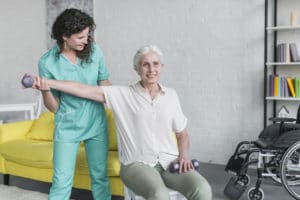
As we get older, it’s almost inevitable that we start to lose strength, agility, mental aptitude and energy. Things that we used to find straightforward, such as bathing, getting dressed, taking the dog for a walk or heading to the shops, gradually become increasingly difficult. And while this can understandably be a source of frustration, it’s a perfectly natural part of the aging process that we need to adapt to.
How to cope with denial in dementia

Being diagnosed with dementia is a hard-enough time for any person and their loved ones, but what can you do if the person refuses all offers of help and support? It’s understandable that someone may go through a short period of not accepting their diagnosis, this can happen with any serious or life-limiting condition.

Looking after another person can be amazingly rewarding but also exhausting at times, and some unpaid carers do it for years with little opportunity for breaks. Carer depression can manifest for a variety of reasons, such as pressure of juggling caring and family, work, and other commitments.
How long does palliative care last?

Palliative care exists to ensure you have the best quality of life possible, regardless of how long that is for, and the healthcare professionals you encounter during your palliative care journey will do all they can to support you with that.
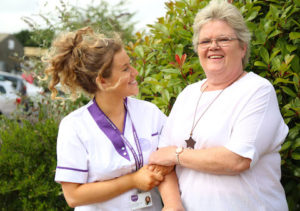
When the need arises for you or your loved one to look for care, it can sometimes be difficult knowing where to start. There are many different types of home care, and many different care providers, and you want to be absolutely certain that you choose a care partner who will be able to support you in every way you need, whatever your condition and whatever your circumstances.
Why get adult mental health support from a carer?

Supporting someone with a mental health problem can be challenging, as not only do you need to support that person, you also need to be able to manage society’s perceptions of that person’s condition, which may think that person is less deserving of care, because they can’t see the ‘hidden disabilities’ they have.
Tips for talking to people with dementia

Dementia doesn’t define someone; it’s important to remember that the person you love is still there when they are living with dementia, it’s just you may have to work a little harder and use different communication strategies to bring them to the fore.
What to do when someone has a stroke
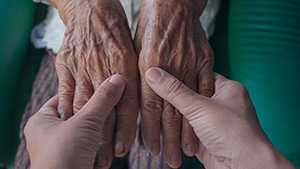
If you suspect that you or someone else has had a stroke it is vital that they receive medical attention as quickly as possible. The NHS tells us that “even if the symptoms disappear while you’re waiting for the ambulance, it’s still important to go to hospital for an assessment.”
Pain management in palliative care
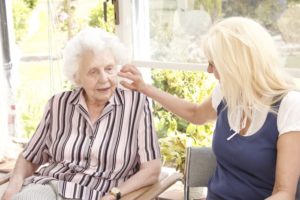
Palliative care can last for many months or even years, and it might only be towards the end of their life that a person requires pain relief, or maybe not at all. For people who are experiencing pain though, it’s important it is managed appropriately by suitably qualified professionals using techniques that suit the person best.

Arthritis nodules are firm lumps of inflammatory tissue, varying in size, that can appear under the skin in people living with rheumatoid arthritis. They usually develop in overexposed joints, such as fingers and elbows, and affect up to 20% of patients with rheumatoid arthritis.
Obtaining a power of attorney for your elderly parent

It can sometimes be difficult to have that initial conversation about power of attorney, particularly if your parents are in good health. The process for appointing power of attorney is a fairly straightforward one, but also requires thought, consideration and compassion. Your parents will almost certainly appreciate the importance of power of attorney, but it still might be a difficult step for them to take.
Moving from a care home to live-in care
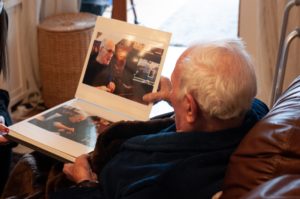
A home is so much more than four walls and a roof. You may have lived in your home for many years, raised a family there, shared a life with a beloved partner and made memories in every square foot. Consequently, you may have been very reluctant to leave it, but feel that you had little choice, due to your care needs.
Benefits of holidays for elderly people with disabilities
Holidays are an important part of life, giving people the opportunity to rest, recuperate, and experience a change of scenery.
At Helping Hands, we want to make sure everyone has the opportunity to experience a holiday, whether in the UK or overseas.
Best food for elderly people with no appetite
It can often be hard to convince elderly loved ones to eat enough food throughout the day to sustain them and provide their bodies with important nutrition.
We’ve listed eight ways in which you can encourage regular, healthy eating habits in elderly people struggling with their appetite.
Are stroke symptoms permanent?
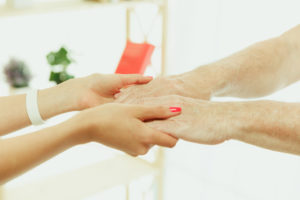 Stroke symptoms that come on suddenly but then disappear within 24 hours mean it was most likely a transient ischaemic attack (TIA), also known as a mini-stroke, but this could be a pre-cursor of a more serious stroke and will give the medical team the opportunity to begin treatment to try and prevent that happening. Although the FAST test identifies most strokes, there may occasionally be different symptoms.
Stroke symptoms that come on suddenly but then disappear within 24 hours mean it was most likely a transient ischaemic attack (TIA), also known as a mini-stroke, but this could be a pre-cursor of a more serious stroke and will give the medical team the opportunity to begin treatment to try and prevent that happening. Although the FAST test identifies most strokes, there may occasionally be different symptoms.
What qualifications should carers have?
Becoming a carer is a highly rewarding and fulfilling role, and even on the most trying days you have the reward of knowing that you made a real positive difference to another person’s life. Achieving relevant qualifications can be desirable for many carers though because it can equip them with more in-depth, specialist knowledge, as well as giving them confidence in their abilities or eligibility to seek promotion.
The 5 most common types of cancer

At Helping Hands we have researched the most common types of Cancer in the UK, alongside possible symptoms and recommended treatments. Read our full guide here for information on:
- Breast Cancer
- Prostate Cancer
- Lung Cancer
- Bowel Cancer
- Melanoma Skin Cancer
Why is brain health important?

As we age, our brains naturally change, just like most other parts of our bodies. As our joints and muscles begin to ache and we tire more easily so does our brain feel the effects of ageing. Many people would agree that as they age their brain doesn’t seem to recall facts as quickly as they used to, or words seem to ‘fall out’ of our brain and we end up substituting them with ‘thingummy’ or ‘whatsit’.
What are the qualities of a good carer?

While exceptional training can help to advance a carer’s skills, there are many qualities that a good carer needs that cannot be taught. These are the natural abilities that a carer needs to feel empathy and compassion for someone and subsequently want to do the best job they can looking after their customer.

The End of Life Care Pathway is a holistic, ‘whole-person’ approach to end of life care and dying, recommended to be used wherever someone wishes to die, whether it be a hospital, care home or in their own home. The pathway includes a commitment to honest discussions with the person at the start of their journey so that their wishes for care are respected at all stages.
What is the osteoporosis T-score?

The T-score results from a special type of X-ray called a Dual Energy X-ray Absorptiometry (DEXA for short) which examines a person’s bone density to discover how much has been lost. This is a non-invasive procedure which sees you lying on a firm hospital couch and having x-rays passed over the relevant parts of your body. The machine will measure the X-rays that your bones absorb, and the result is your T-score.
Top 5 bathing aids for elderly and the disabled
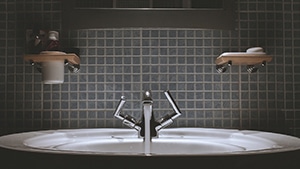
What does arthritis feel like?

The best panic alarms for the elderly
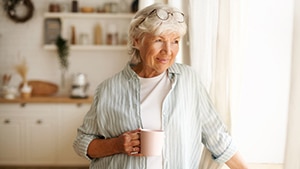
The Best Online Exercise Videos for Over 60s
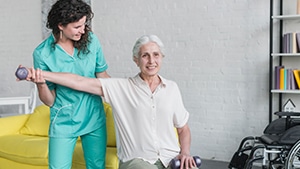

What is the continuing healthcare checklist?

The best clocks for people with dementia
